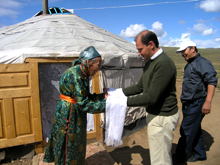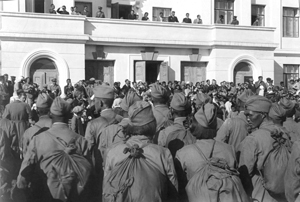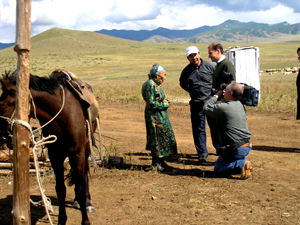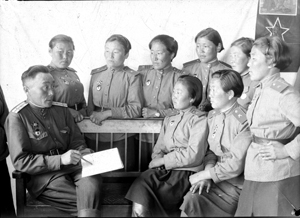 For the 70th Anniversary of the start of the second World War, TV channel Rossiya will show a program about one of little-known allies of the Soviet Union in this war – Tuvan National Republic (now Republic Tuva). For four days, a film team of the federat channel, headed by famous leader Sergei Brilev, worked in Tuva. During this time, he worked with the materials of the Central State Archive of Tuva, interviewed the head of the republic, Sholban Kara-ool, examined noteworthy historical sites, and visited the sheepherding station of the front fighter Vera Bailak. For the 70th Anniversary of the start of the second World War, TV channel Rossiya will show a program about one of little-known allies of the Soviet Union in this war – Tuvan National Republic (now Republic Tuva). For four days, a film team of the federat channel, headed by famous leader Sergei Brilev, worked in Tuva. During this time, he worked with the materials of the Central State Archive of Tuva, interviewed the head of the republic, Sholban Kara-ool, examined noteworthy historical sites, and visited the sheepherding station of the front fighter Vera Bailak. Sergeant of the Tuvan volunteer squadron, Vera Chuldumovna Bailak participated in the liberation of Ukrainian villages and towns from fascist occupation in 1944. Out of the 220 Tuvan volunteers, she is the only one still alive.
 She is the mistress of a large arat farm, and continues to live at the sheep herding station several kilometers from Chadan. This year, her herd has grown to more than 1000 heads of sheep, and at the herders’ holiday Naadym-2009, the legendary cavalry soldier was admitted with honors to the club of “thousanders”. She is the mistress of a large arat farm, and continues to live at the sheep herding station several kilometers from Chadan. This year, her herd has grown to more than 1000 heads of sheep, and at the herders’ holiday Naadym-2009, the legendary cavalry soldier was admitted with honors to the club of “thousanders”.
The 84-year-old front fighter spoke with the Moscow journalist with pleasure, answered his searching questions, and treated him to national dishes.
Vera Chuldumovna’s continued excellent riding abilities astonished Sergei Brilev and his cameraman Igor Kuznetsov. Saying good-bye to the journalist, she firmly kissed him on the cheek, wished him success in his work, and presented him a national sheepskin vest.
In the talk with Premier Sholban Kara-ool, Sergei Brilev remarked that only very few people know about the significant help that tiny Tuva gave to the Soviet Union during the war years.
The TV personality admitted that he became seriously interested in the republic in the Center of Asia after Vladimir Vladimirovich Putin’s repeated visits.
“You have no idea just how mysterious has Tuva become for the whole world, - says Brilev, smiling. – And now, finally, even I got to visit the Center of Asia! Amazing country.”
 Sergei Brilev’s documentary will be aired on September 5, 2009 in the program “News on Saturday”, starting at 8 PM. Sergei Brilev’s documentary will be aired on September 5, 2009 in the program “News on Saturday”, starting at 8 PM.
Remember that Tuvan National Republic (independent state from 1921 to 1944) was one of the first to react to the treacherous attack of the Soviet Union by Germany.
On June 22, 1941, the delegates of the Great Khural of TNR, meeting in Kyzyl, unanimously approved the declaration.
The declaration said: “The Tuvan nation, with its entire revolutionary party and government at its head, not sparing lives or efforts, with all its strength and means, is prepared to join in the fight of Soviet Union against the fascist aggressor until the final victory over him.”
The entire gold reserve of the republic was given to Moscow (around 30 million rubles).
 Between June 1941 and October 1994, Tuva sent five convoys of presents, having collected 50 thousand horses, 52 thousand pairs of skis, 12 thousand short fur coats, 15 thousand pairs of felt boots, 70 thousand tons of sheep wool, several hudred tons of meat, carts, sleigh, horse equipment and other goods to the total sum of about 66.5 million rubles. Several dozen fighter airplanes were bought for the means donated by the population. Between June 1941 and October 1994, Tuva sent five convoys of presents, having collected 50 thousand horses, 52 thousand pairs of skis, 12 thousand short fur coats, 15 thousand pairs of felt boots, 70 thousand tons of sheep wool, several hudred tons of meat, carts, sleigh, horse equipment and other goods to the total sum of about 66.5 million rubles. Several dozen fighter airplanes were bought for the means donated by the population.
In 1942, soviet government admitted Tuvan volunteers into the army service. The first group of volunteers entered the ranks of the Red Army in May 1943, and were incorporated into the 25th tank division ( from February 1944 as a part of 52nd army of the 2nd Ukrainian front), which was fighting in battles on the territory of Ukraine, Moldavia, Romania, Hungary and Czechoslovakia..
In 1943, the second group of 206 volunteers was incorporated into the 8th Cavalry division. “The wild Asians” (as our countrymen were called by a prisoner of war), who resisted tanks and heavy artillery on small horses, were also called “schwarze Tod” – black death- by Germans for their fearlessness, impetuosity and relentlessness.
|
